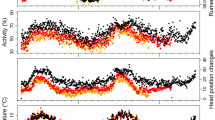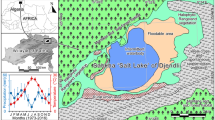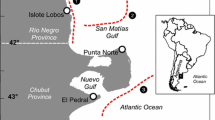Summary
We studied diel periodicity in activity of Adélie penguins (Pygoscelis adeliae) during the austral summer solstice and one month later by counting, hourly, numbers of birds leaving colonies to forage, numbers arriving back after foraging, numbers in a colony and numbers resting outside the colonies. During the solstice large numbers of birds were arriving at and departing from the colony at all times of the day although there was a tendency for more birds to be at sea when light intensity was highest at mid-day. Generally, birds not brooding chicks did not rest on land. A month later, when visibility was poor at mid-night, the percentage of birds at sea was highly positively correlated with light intensity. Birds returning from foraging in the evening fed chicks immediately and then either rested in the colonies or on snow patches between the colonies and the sea until the following morning.
Similar content being viewed by others
References
Aoyanagi M, Tamiya Y (1983) A note on the feeding behavior of the Adélie Penguin. Antarct Rec (Tokyo) 80:39–46
Baur F (1970) Meteorologisches Taschenbuch. Akademische Verlagsgesellschaft Geest and Portig KG, Leipzig
Bowmaker JK, Martin GR (1985) Visual pigments and oil droplets in the penguin Spheniscus humboldti. J Comp Physiol A 156:71–77
Cockrem JF, Eynon GR, Waddington DC (1989) Melatonin and circadian rhythms in the Adélie Penguin (Pygoscelis adeliae). In: Darby J, Davis LS (eds) Penguins. Academic Press, Orlando, Florida
Cott HB (1985) Coloration, adaptive. In: Campbell B, Lack E (eds) A dictionary of birds. Calton, Poyser
Croxall JP, Everson I, Kooyman GL, Ricketts C, Davis RW (1985) Fur seal diving behaviour in relation to vertical distribution of krill. J Anim Ecol 54:1–8
Croxall JP, Davis RW, O'Connell MJ (1988) Diving patterns in relation to diet of Gentoo and Macaroni Penguins at South Georgia. Condor 90:157–167
Culik B, Adelung D, Heise M, Wilson RP, Coria NR, Spairani HJ (1989a) In situ heart rate and activity of incubating Adélie Penguins (Pygoscelis adeliae). Polar Biol 9:365–370
Culik B, Adelung D, Woakes AJ (1989b) Effects of stress on Adélie Penguins (Pygoscelis adeliae) during the breeding season. Proc Vth SCAR Symp Antarct Biol, Hobart, Australia
Derksen DV (1977) A quantitative analysis of the incubation behavior of the Adélie Penguin. Auk 94:552–566
Everson I (1982) Diurnal variations in mean volume backscattering strength of an Antarctic krill patch. J Plankton Res 4:155–162
Godlewska M, Klusek Z (1987) Vertical distribution and diurnal migrations of krill Euphausia superba Dana from hydroacoustic observations SIBEX, December 1983/January 1984. Polar Biol 8:17–22
Halpryn BM, Tirrel PC, Murrish DE (1982) Circadian rhythms in the body temperature of Adélie Penguins. Antarct J US 17:182–183
Howland H, Sivak JG (1984) Penguin vision in air and water. Vision Res 24:1905–1909
Ichii T (1988) [Swarming ecology of Antarctic krill] (in Japanese). Ocean Fish Reslnst Bull 67:1–4
Jerlov NG (1968) Optical oceanography. Elsevier, Amsterdam
Lishman GS (1985) The food and feeding ecology of Adélie penguins (Pygoscelis adeliae) and Chinstrap penguins (P. antarctica) at Signy Island, South Orkney Islands. J Zool London 205:245–263
Martin GR (1985) Eye. In: King AS, McLelland (eds) Form and function in birds, vol 3. Academic Press, London, pp 311–371
Martin GR, Young SR (1984) The eye of the Humboldt Penguin, Spheniscus humboldti, visual fields and schematic optics. Proc R Soc London, Ser B 223:197–222
Müller-Schwarze D (1966) Tagesperiodiek der Altivität des Adéliepinguins im Antarktischen Polartag. Umschau 66:603–604
Müller-Schwarze D (1968) Circadian rhythms of activity in the Adélie penguin (Pygoscelis adeliae) during the austral summer. Antarct Res Ser 12:133–149
Paulin CD, Sagar PM (1977) A diurnal rhythm of activity by the Adélie Penguin. Notornis 24:158–160
Poulter TC (1969) Sonar of penguins and fur seals. Proc Calif Acad Sci 36:363–380
Sivak J (1976) The role of a flat cornea in the amphibious behaviours of the blackfoot penguin (Spheniscus demersus). Can J Zool 54:1341–1346
Sivak J, Millodot M (1977) Optical performance of the penguin eye in air and water. J Comp Physiol 19:241–247
Spurr EB (1972) Social organisation of the Adélie Penguin (Pygoscelis adeliae). Unpublished PhD thesis, University of Canterbury
Spurr EB (1978) Diurnal activity of Adélie penguins Pygoscelis adeliae at Cape Bird. Ibis Unpublished PhD thesis, University of Canterbury 120:147–152
Trivelpiece WZ, Trivelpiece SG, Volkman NJ (1987) Ecological segregation of Adélie, Gentoo and Chinstrap Penguins at King George Island, Antarctica. Ecology 68:351–361
Volkman NJ, Bouloux J, Jazdzedski K, Kittel W, Trivelpiece SG, Trivelpiece WZ (1988) Adélie, Chinstrap and Gentoo Penguin diets during chick rearing at King George Island, South Shetland Islands. Condor (in press)
Wever EG, Herman PN, Simmons JA, Hertzler DR (1969) Hearing in the blackfooted penguin as represented by cochlear potentials. Proc Natl Acad Sci USA 63:676–680
Wilson EA (1907) Aves. British National Antarctic Expedition Report 1901–1904. Nat Hist 4:1–42
Wilson GJ (1983) Distribution and abundance of Antarctic and sub-Antarctic penguins: a synthesis of current knowledge. Biomass Sci Ser 4:1–46
Wilson RP, Wilson M-P (1989) The foraging ecology of breeding Spheniscus penguins. In: Darby J, Davis LS (eds) Penguins. Academic Press, Orlando, Florida
Wilson RP, Coria NR, Spairani HJ, Adelung D, Culik B (1989) Human induced behaviour in Adélie penguins (Pygoscelis adeliae). Polar Biol 10:00–00
Yeates GW (1971a) Observations on orientation of penguins to wind and on colonization in an Adélie penguin rookery at Cape Royds, Antarctica. NZJ Sci 14:901–906
Yeates GW (1971b) Diurnal activity in the Adélie Penguin (Pygoscelis adeliae) at Cape Royds, Antarctica. J Nat Hist 5:103–112x
Author information
Authors and Affiliations
Rights and permissions
About this article
Cite this article
Wilson, R.P., Culik, B., Coria, N.R. et al. Foraging rhythms in Adélie penguins (Pygoscelis adeliae) at hope bay, Antarctica; determination and control. Polar Biol 10, 161–165 (1989). https://doi.org/10.1007/BF00238490
Received:
Accepted:
Issue Date:
DOI: https://doi.org/10.1007/BF00238490




